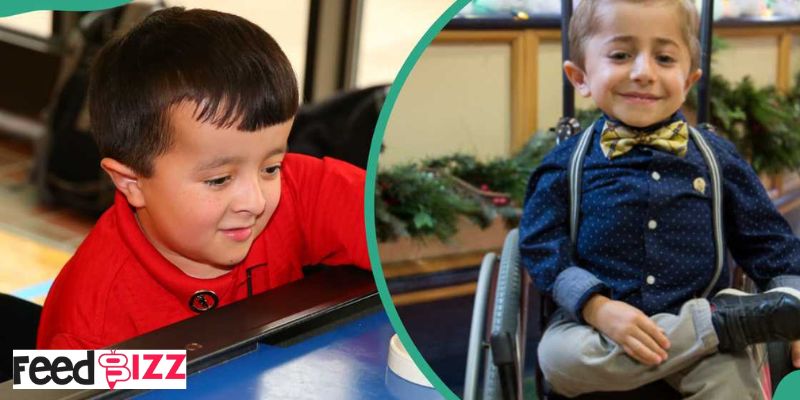In today’s era of new media and advertising, no tale comes close to those of Alec Cabacungan and Kaleb-Wolf De Melo Torres. These two boys, being the little spokesmen of Shriners Hospitals for Children, have been featured in different commercials that have moved millions of people. That is why their combination of courage and charisma has helped to increase awareness of the existence of this hospital and attract many inspiring people. But beyond the heartwarming scenes, a question lingers in the minds of viewers: Do Alec and Kaleb get paid for commercials?
I will be quick to point out that these young boys are, in fact, paid for the work they do. As much as they are representatives of a worthy cause, their presence in commercials is also work-related. The pay not only enables them to sustain their families but also recognizes their massive input to the outreach and fundraising activities of Shriners Hospitals.
Details about Alec and Kaleb’s testimonial, their evolution from patients to spokesmen for the Shriners Hospitals for Children and the financial implications of their positions are discussed in this article. We will also look at how their commercials have influenced the hospital or fired people up in the accomplishment of their mission. We deserve to see more and we need to take a closer look at these fabulous tales as those of Alec and Kaleb and learn the genuine significance of these fellahs to the screen.
Who Are Alec and Kaleb? The Faces Behind the Screen
Alec Cabacungan and Kaleb-Wolf De Melo Torres are the actors you can see on TV, together with being real patients of Shriners Hospitals for Children with their own stories. Alec, who has flawless pronunciation and an endearing smile, has osteogenesis imperfecta, a genetic disorder that weakens bones. Nevertheless, Alec is now rather a celebrated personality who actively relates his story and fights for other children with the same disorders.
On the other hand, Kaleb was diagnosed with brittle bone disease at birth, which had seen him struggle with several medical complications from birth. Simpson has a brilliant character and has endured a lot; he is another spokesman besides Alec. Altogether, they have performed various advertisements, and their main intention has been to inspire people with their encouraging slogans. They are living proofs of the difficulty that the human spirit can be, and that makes them beautiful candidates to represent the cause.
Shriners Hospitals for Children: A Legacy of Compassion
Shriners Hospitals for Children is an organization of non-profit specialty hospitals located throughout North America providing care to children with orthopaedic problems, burns, spinal cord injuries and cleft lip and palate. This company was established in 1922 and has been in support of excellent health care service delivery regardless of the family’s financial status. Both Alec and Kaleb are good examples of the great work that the hospital has done in an effort to change people’s lives.
In this case, Alec and Kaleb are used by Shriners Hospitals in their commercials with the main objective of sensitizing people to the health facilities provided by the hospital as well as getting donations. These commercials are not just advertisements; they are about telling the truth: the impact of the hospital on the lives of children. The inspiring personal narratives of Alec and Kaleb are emblematic of what Shriners Hospitals is indeed: hope, recovery, and the caring institution to ensure that children are given the best chance at happy and healthy futures.
Do Alec and Kaleb Get Paid for Commercials?
Another common question that people have is whether Alec and Kaleb are paid for their commercials. Yes, they are paid for doing that, and these payments are usually in the form of cash or kind. This kind of arrangement is significant for the families of both Alec and Kaleb, as well as for preventing unethical practices in the advertisements. Shriners Hospitals’ decision to pay these young spokesmen reaps value in that the organization recognizes the time, energy, and change that Alec and Kaleb contribute to their causes.
The type of remuneration that actors and other performing arts receive mainly involves fixed fees and a percentage of royalties depending on the profit of the commercials. This financial support assists with any other requirements that they may require and appreciates their support in outreach programmes of the hospital. Their involvement in these commercials is not benefited for charity only; it is a professional commitment too; they are also representing, they are the faces that work for this hospital.
How Much Do Alec and Kaleb Get Paid for Commercials?
While it’s clear that Alec and Kaleb receive compensation, the exact figures are not publicly disclosed. This privacy is understandable, given that specific financial details can be sensitive, especially when minors are involved. However, it’s reasonable to assume that their compensation aligns with industry standards for similar roles. This payment structure likely includes standard commercial fees, as well as royalties, depending on the reach and impact of the ads.
The arrangement ensures that Alec and Kaleb are fairly compensated for their time and contribution. It also supports their families, acknowledging the sacrifices they make in allowing their children to participate in these campaigns. While the precise amount remains private, the fact that they are compensated reflects the ethical approach of Shriners Hospitals in valuing the contributions of their young spokesmen.
The Impact of Alec and Kaleb’s Commercials on Shriners Hospitals
To a variety, the commercials with Alec and Kaleb have transformed Shriners Hospitals for Children so distinct. As for these ads, they are aimed at stirring people’s sympathy and making them responsive to the mission of the hospital offering their money. Sidelining the medical aspects, the real themes that came out of the stories of Alec and Kaleb are hope, courage, betterment, and care.
Both their appearances have ensured that the hospital gets the required millions to keep on offering free medical services to children. The mentioned commercials are great examples of how storytelling works in the advertising industry. In turn, with reference to the personal stories of Alec and Kaleb, Shriners Hospitals can convey the message to as many people as possible, drawing attention to the necessity to support the specialist and the institution itself as well as the services that can be provided for children.
Commercials Featuring Alec and Kaleb: A Closer Look
Alec and Kaleb have appeared in a series of heartwarming commercials for Shriners Hospitals, each designed to highlight different aspects of their experiences. These commercials often feature Alec and Kaleb engaging in everyday activities, speaking directly to the camera about their lives and the care they receive. Some notable commercials include:
- Alec & Kaleb Video Chat: In this commercial, Alec and Kaleb engage in a light-hearted video chat, sharing personal stories and how Shriners Hospitals has positively impacted their lives. The commercial captures their personalities and highlights their friendship, making it relatable and endearing to viewers.
- Stories of Love: This series focuses on the individual stories of Alec and Kaleb, showcasing their resilience and the comprehensive care they receive at Shriners Hospitals. It aims to show that these are not just patients but children with dreams, ambitions, and the will to overcome their challenges.
- Holiday Campaigns: Alec and Kaleb have also been featured in various holiday-themed commercials aimed at encouraging viewers to donate during the festive season. These commercials often tug at the heartstrings, highlighting the joy and hope that Shriners Hospitals bring to children’s lives during special times of the year.
The Role of Alec and Kaleb as Ambassadors
Alec and Kaleb’s role goes beyond just appearing in commercials; they serve as ambassadors for Shriners Hospitals for Children. As public figures, they represent the mission and values of the organization, helping to spread awareness and generate support. Their involvement brings a human face to the hospital’s efforts, making the cause more relatable and compelling to the public.
In their capacity as ambassadors, both Alec and Kaleb go to functions, conduct interviews or deal with the donors. They are lobbyist by inherent nature and outdoors by training, making them orators who can reach out to varied audiences. When people listen to Alec and Kaleb’s stories, they learn about pediatric healthcare and Shriners Hospitals for Children, which is so invaluable.
Alec and Kaleb’s Legacy and Future Endeavors
It remains out of debate the positive change that Alec and Kaleb brought to Shriners Hospitals and the whole society. Through these commercials they have also not only been informative but also encouraging millions of people to embrace the hospital’s call. The story of Alec and Kaleb embodies the spirit of survival as well as the purpose of sharing people’s experiences. They have demonstrated that even when things are hard, one can do a lot to help others.
As they continue to grow and evolve, Alec and Kaleb’s future endeavours may include expanding their roles as advocates for children’s health. Their ongoing involvement with Shriners Hospitals ensures that their message of hope and healing continues to reach those who need it most. Alec and Kaleb are not just spokesmen; they are champions for the cause, paving the way for future generations of children who will benefit from the support of Shriners Hospitals.
Conclusion
The growth of Alec and Kaleb, from the patients to the spokesmen of the Shriners Hospitals for Children, is an inspiring story about success based on the desire to live and the ability to communicate. Their participation in the commercials is beneficial in the following ways: It plays a role in fundraising for the hospital: Millions of people watch them and get motivated.
The culmination is the response to the question as to whether Alec and Kaleb do get paid for commercials, where it can be answered assertively, indeed, for the benefit of themselves and the hospital’s outreach and fondness campaigns.
Alec and Kaleb are rather powerful now, for they provide their personal stories to the viewers and make them feel how the problem influences their lives. What they left behind is a message that regardless of one’s age, one can make a difference. It remains clear that as long as Alec and Kaleb represent Shriners Hospitals, more people will be encouraged to support this noble cause of ensuring that all children receive the kind of care and understanding they need.
FAQs
Do Alec and Kaleb get paid for commercials?
Yes, Alec and Kaleb do receive compensation for their appearances in Shriners Hospitals for Children commercials. This includes a combination of upfront fees and potential royalties, acknowledging their significant contributions to the hospital’s marketing and fundraising efforts.
How much do Alec and Kaleb get paid for commercials?
The exact amount Alec and Kaleb are paid for their commercials is not publicly disclosed. However, it is understood that their compensation aligns with industry standards and is structured to support both their families and their role as spokesmen for Shriners Hospitals.
What impact do Alec and Kaleb have on Shriners Hospitals?
Alec and Kaleb’s appearances in commercials have been instrumental in raising awareness and funds for Shriners Hospitals for Children. Their stories resonate with viewers, creating emotional connections that translate into donations and support for the hospital’s mission.
What roles do Alec and Kaleb play as ambassadors for Shriners Hospitals?
As ambassadors, Alec and Kaleb represent Shriners Hospitals for Children at events, in interviews, and through media campaigns. They share their personal experiences, helping to educate the public about the importance of pediatric healthcare and the work of Shriners Hospitals.
Will Alec and Kaleb continue their involvement with Shriners Hospitals in the future?
While their specific future roles are not detailed, Alec and Kaleb are likely to continue their involvement with Shriners Hospitals, given the positive impact they have had. Their ongoing participation helps keep the hospital’s message of hope and healing alive.









